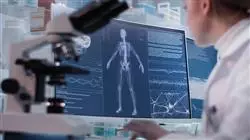University certificate
The world's largest artificial intelligence faculty”
Introduction to the Program
You will explore significant trends in the response to various treatments, as well as the prediction of clinical outcomes, thanks to this 100% online program"

One of the challenges that medical professionals face on a daily basis involves the study of large volumes of data such as medical records, clinical cases, test results, etc. However, this information is essential for the correct planning and implementation of therapeutic treatments. Faced with this situation, Machine Learning has become a fundamental pillar in overcoming this challenge. Thanks to Big Data, specialists can prevent accidents or decide what is the best therapy for a given patient. Undoubtedly, these analytical techniques significantly improve medical care and contribute to increasing the quality of life of citizens.
Therefore, TECH has implemented a Postgraduate diploma that will focus on the analysis of Big Data and Machine Learning in Clinical research. Therefore, the syllabus will delve into the main methodologies for Data Mining and anomaly detection in biomedical records. In relation to this, the agenda will deal with Deep Learning given its importance to boost precision medicine. At the same time, the program will analyze the processing of natural language in scientific and clinical documentation.
To this end, the program will provide experts with the most effective tools for extracting relevant information from medical texts. It will also delve into the use of neural networks for disease modeling and treatment prediction.
Moreover, to reinforce such contents, the methodology of this program reinforces its innovative character. TECH offers a 100% online learning environment, adapted to the needs of busy professionals seeking to advance their careers. In addition, it will employ the Relearning methodology, based on the repetition of key concepts to fix knowledge and facilitate learning. In this way, the combination of flexibility and a robust pedagogical approach makes it highly accessible.
You will develop the most optimal strategies to take advantage of Artificial Intelligence and optimize clinical research thanks to TECH"
This Postgraduate diploma in Data Analysis with Artificial Intelligence in Clinical Research contains the most complete and up-to-date program on the market. Its most notable features are:
- Development of practical cases presented by experts in Analysis of AI Technologies in Clinical Practice
- The graphic, schematic, and practical contents with which they are created, provide scientific and practical information on the disciplines that are essential for professional practice
- Practical exercises where the self-assessment process can be carried out to improve learning
- Its special emphasis on innovative methodologies
- Theoretical lessons, questions to the expert, debate forums on controversial topics, and individual reflection assignments
- Content that is accessible from any fixed or portable device with an Internet connection
You will delve into pharmaceuticals and treatment simulation as part of the contribution of Artificial Intelligence to health research"
The program’s teaching staff includes professionals from the industry who contribute their work experience to this program, as well as renowned specialists from leading societies and prestigious universities.
The multimedia content, developed with the latest educational technology, will provide the professional with situated and contextual learning, i.e., a simulated environment that will provide immersive education programmed to learn in real situations.
This program is designed around Problem-Based Learning, whereby the professional must try to solve the different professional practice situations that arise during the academic year For this purpose, the students will be assisted by an innovative interactive video system created by renowned and experienced experts.
Do you want to successfully face the challenges related to the management of large volumes of data? Specialize in Big Data with this program in just 6 months"

You will face the challenges associated with the management of large data sets, information security and practical applications of Big Data in the biomedical field"
Why study at TECH?
TECH is the world’s largest online university. With an impressive catalog of more than 14,000 university programs available in 11 languages, it is positioned as a leader in employability, with a 99% job placement rate. In addition, it relies on an enormous faculty of more than 6,000 professors of the highest international renown.

Study at the world's largest online university and guarantee your professional success. The future starts at TECH”
The world’s best online university according to FORBES
The prestigious Forbes magazine, specialized in business and finance, has highlighted TECH as “the world's best online university” This is what they have recently stated in an article in their digital edition in which they echo the success story of this institution, “thanks to the academic offer it provides, the selection of its teaching staff, and an innovative learning method aimed at educating the professionals of the future”
A revolutionary study method, a cutting-edge faculty and a practical focus: the key to TECH's success.
The most complete study plans on the university scene
TECH offers the most complete study plans on the university scene, with syllabuses that cover fundamental concepts and, at the same time, the main scientific advances in their specific scientific areas. In addition, these programs are continuously being updated to guarantee students the academic vanguard and the most in-demand professional skills. In this way, the university's qualifications provide its graduates with a significant advantage to propel their careers to success.
TECH offers the most comprehensive and intensive study plans on the current university scene.
A world-class teaching staff
TECH's teaching staff is made up of more than 6,000 professors with the highest international recognition. Professors, researchers and top executives of multinational companies, including Isaiah Covington, performance coach of the Boston Celtics; Magda Romanska, principal investigator at Harvard MetaLAB; Ignacio Wistumba, chairman of the department of translational molecular pathology at MD Anderson Cancer Center; and D.W. Pine, creative director of TIME magazine, among others.
Internationally renowned experts, specialized in different branches of Health, Technology, Communication and Business, form part of the TECH faculty.
A unique learning method
TECH is the first university to use Relearning in all its programs. It is the best online learning methodology, accredited with international teaching quality certifications, provided by prestigious educational agencies. In addition, this disruptive educational model is complemented with the “Case Method”, thereby setting up a unique online teaching strategy. Innovative teaching resources are also implemented, including detailed videos, infographics and interactive summaries.
TECH combines Relearning and the Case Method in all its university programs to guarantee excellent theoretical and practical learning, studying whenever and wherever you want.
The world's largest online university
TECH is the world’s largest online university. We are the largest educational institution, with the best and widest online educational catalog, one hundred percent online and covering the vast majority of areas of knowledge. We offer a large selection of our own degrees and accredited online undergraduate and postgraduate degrees. In total, more than 14,000 university degrees, in eleven different languages, make us the largest educational largest in the world.
TECH has the world's most extensive catalog of academic and official programs, available in more than 11 languages.
Google Premier Partner
The American technology giant has awarded TECH the Google Google Premier Partner badge. This award, which is only available to 3% of the world's companies, highlights the efficient, flexible and tailored experience that this university provides to students. The recognition as a Google Premier Partner not only accredits the maximum rigor, performance and investment in TECH's digital infrastructures, but also places this university as one of the world's leading technology companies.
Google has positioned TECH in the top 3% of the world's most important technology companies by awarding it its Google Premier Partner badge.
The official online university of the NBA
TECH is the official online university of the NBA. Thanks to our agreement with the biggest league in basketball, we offer our students exclusive university programs, as well as a wide variety of educational resources focused on the business of the league and other areas of the sports industry. Each program is made up of a uniquely designed syllabus and features exceptional guest hosts: professionals with a distinguished sports background who will offer their expertise on the most relevant topics.
TECH has been selected by the NBA, the world's top basketball league, as its official online university.
The top-rated university by its students
Students have positioned TECH as the world's top-rated university on the main review websites, with a highest rating of 4.9 out of 5, obtained from more than 1,000 reviews. These results consolidate TECH as the benchmark university institution at an international level, reflecting the excellence and positive impact of its educational model.” reflecting the excellence and positive impact of its educational model.”
TECH is the world’s top-rated university by its students.
Leaders in employability
TECH has managed to become the leading university in employability. 99% of its students obtain jobs in the academic field they have studied, within one year of completing any of the university's programs. A similar number achieve immediate career enhancement. All this thanks to a study methodology that bases its effectiveness on the acquisition of practical skills, which are absolutely necessary for professional development.
99% of TECH graduates find a job within a year of completing their studies.
Postgraduate Diploma in Data Analysis with Artificial Intelligence in Clinical Research
Welcome to the epicenter of the clinical research revolution at TECH Global University, where we introduce you to our featured postgraduate program: the Postgraduate Diploma in Data Analysis with Artificial Intelligence in Clinical Research. In a medical world driven by innovation, the ability to analyze data effectively and efficiently is crucial. This program is designed for healthcare professionals and data scientists looking to advance their careers and lead at the forefront of clinical research with the latest Artificial Intelligence (AI) tools. Our online classes give you the flexibility to take your learning to the next level from anywhere in the world. With the guidance of experts in AI and clinical research, you'll explore in depth how technology can empower clinical data analysis, improving efficiency and accuracy in medical decision-making.
Specialize in clinical research through Artificial Intelligence
This Postgraduate Diploma, taught by our Artificial Intelligence faculty, will immerse you in the most advanced data analysis methodologies, from the processing of large data sets to the implementation of predictive algorithms in clinical studies. You will learn how to extract meaningful insights that drive medical research to new frontiers. TECH Global University is proud to offer a postgraduate program that fuses clinical expertise with technological innovation. As you progress through the course, you will participate in hands-on projects that will allow you to directly apply your knowledge, preparing you for the challenges of data analysis in today's clinical research. Empower yourself to make a difference in clinical research with confidence as you graduate from this Postgraduate Diploma. Join us and discover how the combination of AI and clinical research can drive significant advances in healthcare and medicine.







